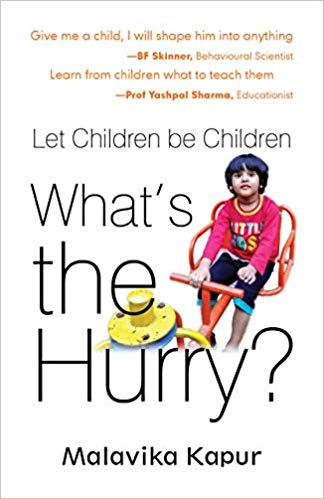
What's the Hurry- Let Children be Children
ISBN: 9789386473301
Author: Malavika Kapur
Price: 399 Rs.
Binding: PB
Language: English
Year: 2018
PREVIEW
About The Book
In India, the socio-economic system generally ignores mental health of children. Neither parents, nor the teachers, nor the government acknowledge that every child, irrespective of caste, colour, class or creed is entitled to equity, justice, opportunity and affection. When the National Institute of Mental Health and Neuro Sciences, Bangalore began its first Community Mental Health Movement, author Malavika Kapur was a part of it, approaching the schools with the aim of sensitising teachers to mental health of children. In Ayurveda, the total support for the woman and child before and after birth is an extraordinarily well-thought out social practice. The samskaras provide for stage-wise development of the child. India's tradition say, 7-11 is the phase to begin scholastic activities. In multilingual India, only English is the upwardly mobile language. Strangely, India is adopting a system that is neither Indian nor Western where her 135 million children are at risk. Malavika and her colleagues found that teachers were neither interested, nor motivated to help children by promoting their psychosocial development. Their sole interest was in promoting academic performance.
After assessment and assistance programmers with 10,000 urban school children, 1500 rural children and about 2000 tribal children, the NIMHANS teams came up with a set of conclusions.
Children in India, even from well-to-do families, are surrounded by adverse conditions. In homes as well as schools. Home, school, society, knowingly or unknowingly, compromise a child's mental health and growth. India has forgotten the lessons from her scriptures and legends. That children come with three kinds of temperaments. That reading and writing before the prescribed age (about 6 years) for Vidya arambh is WRONG. There is a right time for everything. That a child's language skills develop best from three years on and Indians have a natural gift which is ignored. There is almost no PLAY, only learning by rote and too much of emphasis on technology, television and mobile phones. Keeping all these issues in mind, this book asks WHAT'S THE HURRY. It tells parents and teachers: Give The Child Time to Grow the Play-Way. LET CHILDREN BE CHILDREN.
About the Author
Malavika Kapur is a Visiting Professor at National Institute of Advanced Studies, Indian Institute of Science and former Head of the Department of Clinical Psychology at the National Institute of Mental Health and Neurosciences. She has fifteen books and over 100 publications to her credit. She is a Fellow of the Indian Association of Clinical Psychologists, the Indian Association of Child and Adolescent Mental Health and the BritishPpsychological Society. She has also been honoured by the National Academy of Psychology with the honorary fellowship and life time achievement award. She has been a consultant for organizations such as the WHO, UGC, NCERT, NIPCCD, ICMR and ICSSR. She has been twice awarded the scholar in residency at the Study and Conference Centre, at Bellagio in Italy, by the Rockefeller Foundation. She is on the advisory Board member of Child and Adolescent Mental Health section of the ICD 11.
Her areas of interest are Developmental Psychology, Community Mental Health Programmes for Children and Adolescents in, Primary Health Care personnel and Anganawadi Workers. She has developed of tools of assessment and intervention packages the promotion of psycho-social development and for psychological problems of children and adolescents in Child Guidance Centres as well as Urban, Rural and Tribal Schools. Her main contribution is her work of developing integrated models of mental health service delivery for children and adolescents.
She is a prolific reader with deep interest in performing arts. She is an inveterate traveller and loves trekking in the Himalayan foothills.
555
Copyright 2022 VitastaPublishing. All rights Reserved Designed by CrissCross Solutions LLP.

